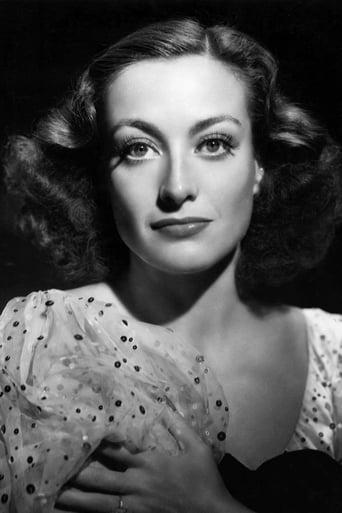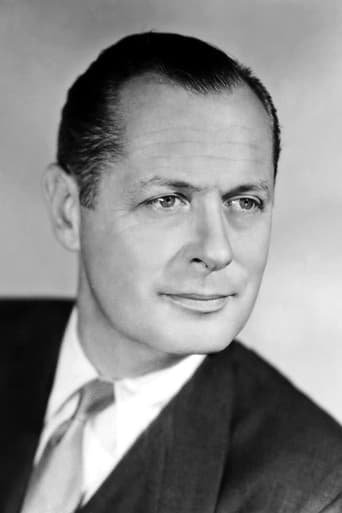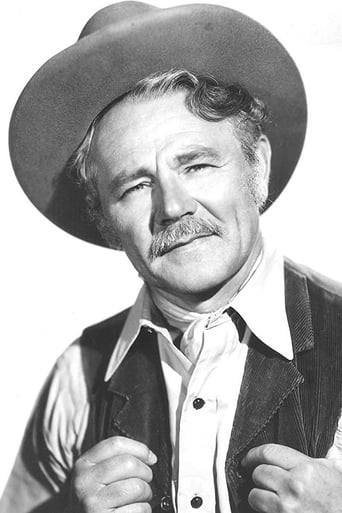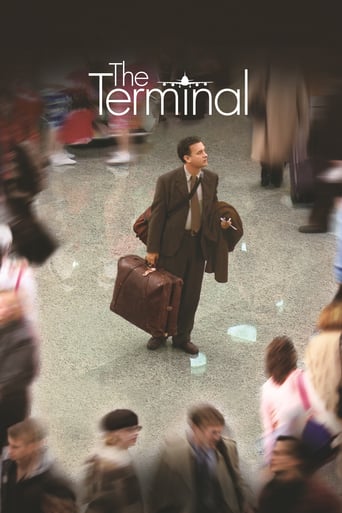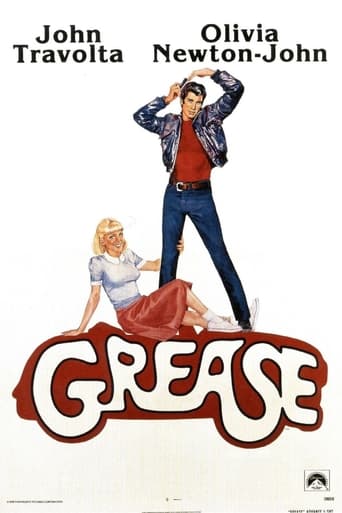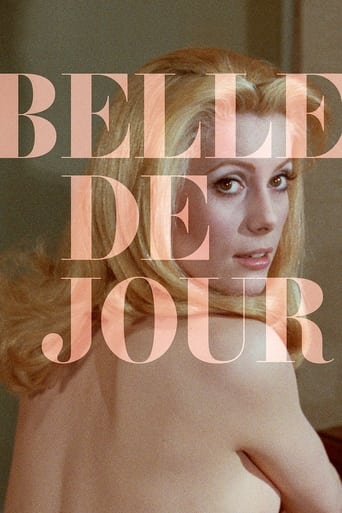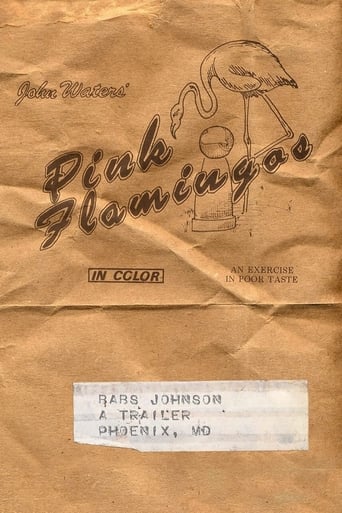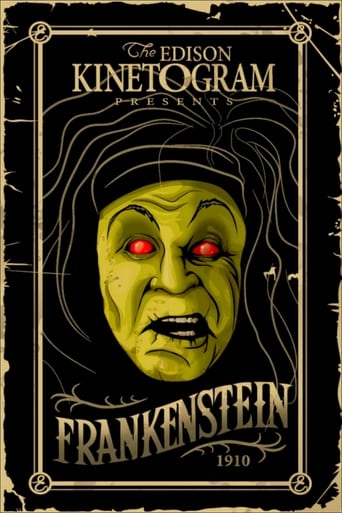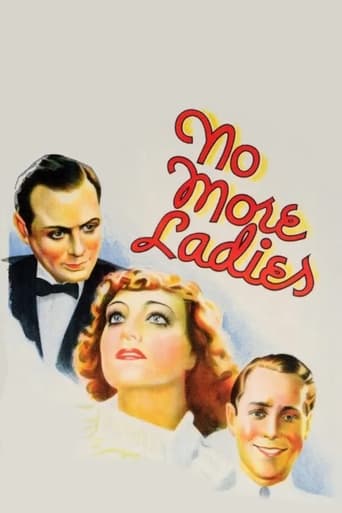
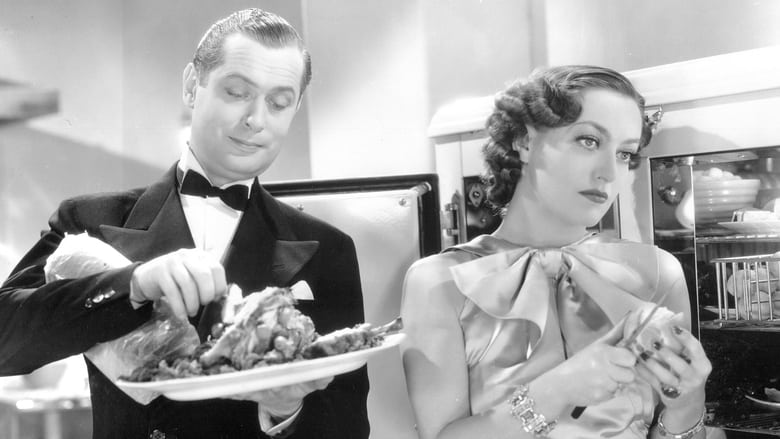
No More Ladies (1935)
A society girl tries to reform her playboy husband by making him jealous.
Watch Trailer
Cast


Similar titles
Reviews
Touches You
Good movie but grossly overrated
A lot of perfectly good film show their cards early, establish a unique premise and let the audience explore a topic at a leisurely pace, without much in terms of surprise. this film is not one of those films.
This is a small, humorous movie in some ways, but it has a huge heart. What a nice experience.
With Joan Crawford as satin-gowned, glamorous Marcia of the shades of white/art deco bedroom, Robert Montgomery as the well-dressed ladies man/playboy/heel who marries Marcia but can't stop chasing the ladies, sexy Franchot Tone as Jim, whose wife was stolen by our ladies man, Edna May Oliver as highball drinking, one-liner talking Grandma Fanny, and Charles Ruggles as the drunkard, plus a slick MGM look and feel - you would think this film would be smart, funny, terrific, all it should be - it's not.The problem here is the lousy script - the characters do things that make little sense or just seems dumb, and more importantly, the film is just BORING. I was pretty much thinking "when is this going to end" - that's not a good thing. I did *not* find the two main characters sympathetic, so could really care less what happened to them. I mean, the Robert Montgomery character is just a complete cad, he should have been thrown out by her right near the beginning. Joan Crawford's character just comes across as a brat to me - so who cares what happens with her anyway. Even my handsome Franchot Tone is given so little to do here, he's just wasted. The acting here is fine, but with the story as it is, this film is just dull. Edna May Oliver is the only saving grace here, she *is* pretty funny.
For sporadic moments of amusement "No More Ladies" is perfectly satisfactory. It has the MGM lusciousness and gleam that the other studios envied. Note the great looking costumes on Joan Crawford, Joan Fontaine, and Gail Patrick wear. The sophistication is showed by the ho-ho-ho jokes that are dropped by the likes of Crawford, Robert Montgomery, Franchot Tone, and Edna Mae Oliver. This is the type of film that has the hero with a name like "Sherry". People go to night clubs, and to fancy restaurants, and take drives in Central Park at night (it is, after all, the 1930s).The film is a bore - it occasionally amuses because of the cast, but the dialog is brittle for the sake of brittle. It is Noel Coward's world but not the real wit he brought - Coward's best plays show a streak of harshness and mutual malevolence mixed with affection in his couples like Amanda and Elyot in "Private Lives". They also tend to be smarter than the characters here.Also the characters are not all that amusing nowadays. Montgomery's cousin is Charlie Ruggles, who is constantly drunk. Ruggles is a favorite comedian to me, but here he was dull. Reginald Denny is around as a British version of Ralph Bellamy - an available alter-suitor to Montgomery for Crawford, and while Denny is elegant (in a skittish sort of way) he is not at all as amusing as Ralph Bellamy was in "His Girl Friday" or The Awful Truth".After watching this film I stopped to consider the three leads. Montgomery was typecast for most of the 1930s (except for an occasional film like "The Big House") as a happy, amoral socialite. Nobody really played the upper-crust cad as well as he did, but he got bored by it, and fought for meatier parts - and after his brilliant Danny in "Night Must Fall" he got them. Crawford reveled in parts like the hard-working lower class girl fighting her way to happiness, but she did many "socialite" parts as well. Along came "The Women", and she played a villainous social climber. After that came the really hard-boiled darker parts of the 1940s and 1950s like "Mildred Pierce" and "A Woman's Face" and "Flamingo Road". Tone, in 1935, would start having roles like Bryam in "Mutiny On The Bounty" - like Montgomery he would play his wealthy cads, but he would be able to step into nastier, meatier roles like "The Phantom Lady" and "The Man On The Eiffel Tower". When one talks to their fans about the great work of these three actors, it is the films where they played characters with demons after them that are recalled. Few really recall a piece of meaningless cotton candy like "No More Ladies" regarding any of them.
You've seen it all before, folks--another tiresome romantic comedy, unredeemed by an accomplished cast and the trademark MGM gloss. Joan Crawford is especially wasted in the airy proceedings; her dramatic intensity has no outlet here, and she is forced to rely on her lesser skills as a sophisticated comedienne. This is Carole/Claudette/Irene territory, and, although Joan can give these ladies cards in spades when it comes to glamour, she lacks their lighter touch. I suspect two forces were at work here: the Production Code of 1933, which forced out earthy drama and bawdy comedy and pushed stars like Harlow and Crawford into fluff, and the "Norma" syndrome at MGM, which forced Crawford to take Norma's castoff parts. (No wonder Joan ended up "box-office poison" shortly after pictures like this alienated her fan base!) If you'd like to see Joan in comedies more suited to her persona, check out her splendidly bitchy Crystal in "The Women", or as the clueless Susan in "Susan and God".
The unoriginal plot, about a rich married couple dealing with problems of infidelity, is secondary here to the clever dialogue by Donald Ogden Stewart, who wrote the screenplay to The Philadelphia Story, and to a strong supporing cast. Joan Crawford is fine, but Robert Montgomery and Franchot Tone, fighting for Crawford's hand, wind up being nearly indistinguishable from each other, both in looks and in character. That leaves the supporting cast to rescue the film: Charles Ruggles has a fun bit as a slurring drunk and Arthur Treacher comes in at the end as a stuffy Brit who mumbles loudly and misuses American slang. Even Gail Patrick, who isn't normally given much to do in her man-stealing parts, is fine here. But the best is Edna May Oliver, playing the wise and witty matriarch--she steals every scene she's in and was the main reason I finished watching the movie.


